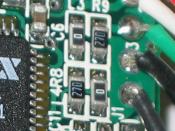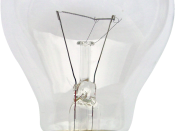Does Increasing the Length of a Nichrome Wire Affect its Resistance?
Introduction
In this experiment I am going to see weather the thickness of wire will affect the resistance of a wire. I will also be seeing weather different lengths of wire effect the resistance of the wire. I will be setting up the wire to a circuit and will be using a ammeter and volt metre to record my results.
Background information
Electric current is a flow of electrons along a conductor like a metal wire. The electric cell pushes the electrons round the circuit. Break the circuit and the electrons cannot flow. Electric current is not used up because electrons are not destroyed. Light bulbs produce light because they have high resistance and resist the flow of the electrons. The current is measured in amps using an ammeter.
Potential difference provides push to drive the current round the circuit; potential difference is measured in volts.
In a series circuit the potential difference supplied by the battery is divided up between components in the circuit.
Resistance is a measure of how hard it is to get a current to flow through a component at a particular potential difference or voltage. Each component in a circuit has a resistance.
Prediction
I think that if I increase the length of the wire, then the resistance will increase. I also think as the thickness of the wire is increased the resistance will decrease, I think this because An electric current flows when charged particles called electrons move through a conductor. The moving electrons can collide with the atoms of the conductor. This makes it more difficult for the current to flow, and causes resistance. Electrons collide with atoms more often in a long wire than they do in a short wire. A...


